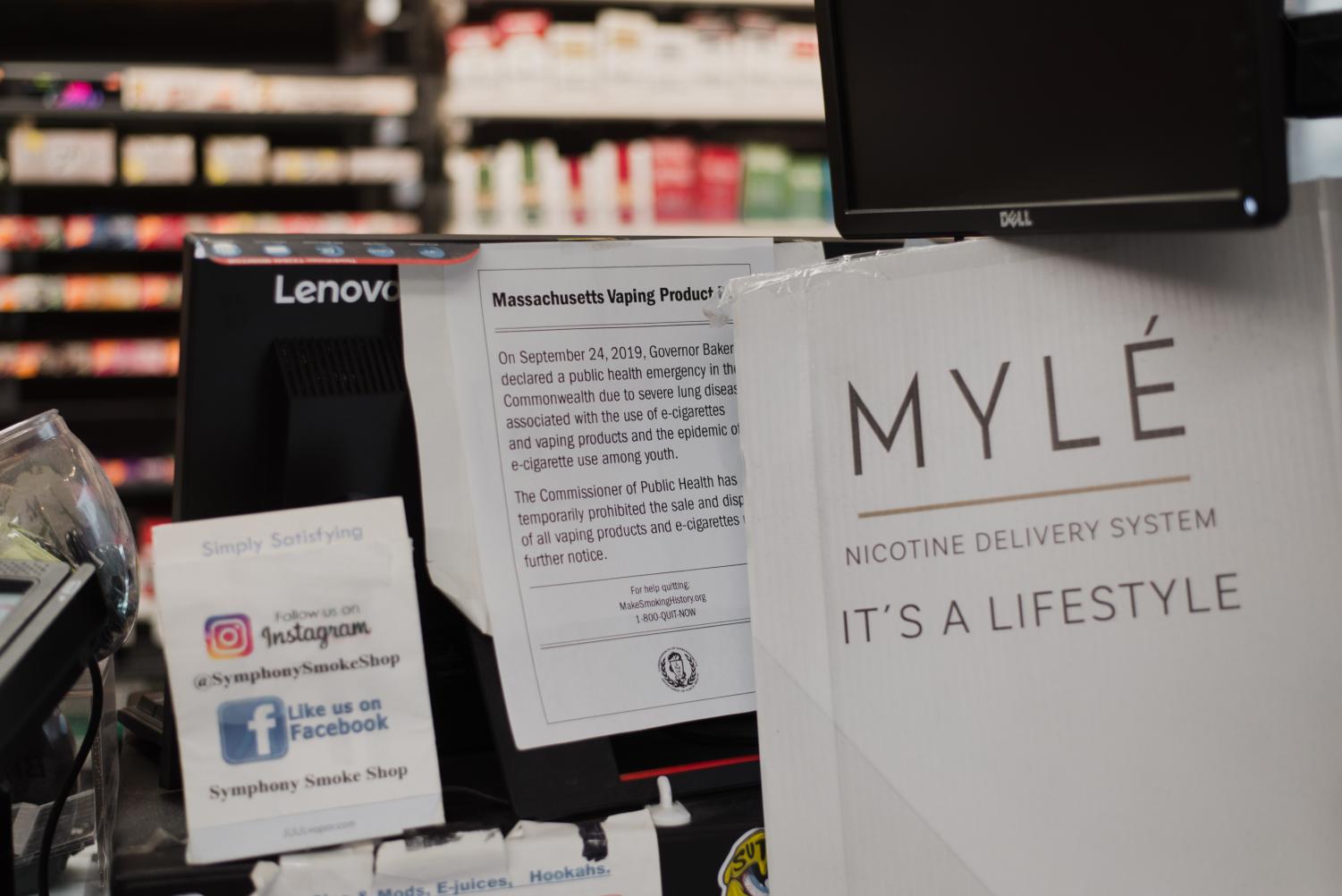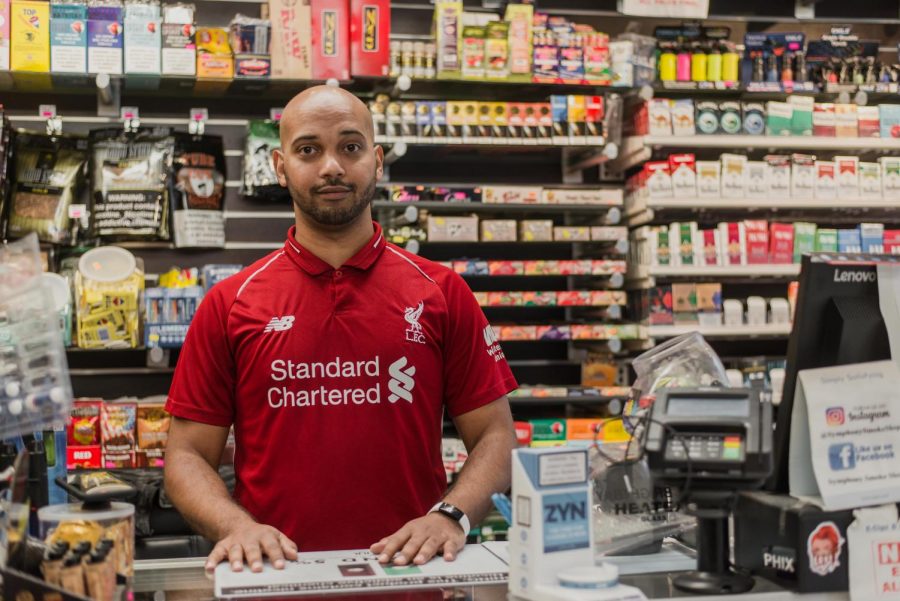Local vape shops take hit from Baker’s ban
Mohammed Belkes, an employee of Symphony Smoke Shop in Back Bay, says vaping products made up between 40 to 49 percent of the shop’s revenue.
October 9, 2019
Massachusetts’ temporary ban on the sale of all vaping products is the strictest in the nation. Its severity is causing new problems for local businesses and raising concerns about its effectiveness in addressing public health.
Gov. Charlie Baker declared a public health emergency Sept. 24 in response to the outbreak of vaping-related lung disease in Massachusetts, in which he called for a four-month statewide ban on the sale of all vaping products. The temporary ban is meant to give medical experts the opportunity to identify the cause of the diseases and figure out how to regulate the products.
Other states, such as New York, have banned certain flavors of e-cigarettes, but no state has taken as strict of a stance as Massachusetts. The urgency and severity of the ban caught many off guard.
“I didn’t believe it, mostly because this is unprecedented,” said Jasmine Williams, a third-year business administration and psychology combined major at Northeastern. “My friends were telling me that this ban was happening and I was like, ‘OK, sure.’ I was just denying it, then I went into my local vape store and saw all the shelves empty.”
Smoke and vape shop owners were hit with the same wave of shock when Baker’s announcement hit headlines. Linda Vick, co-owner of Vick’s Vape Shop in Medford, first heard the news of the ban on TV. She was frustrated by the lack of communication and confused about what to do with her stock of vaping products.
“We knew there were bans going on throughout the United States, but everyone has been given time to sell their products and figure out what they’re going to do as a business owner. We in Massachusetts had absolutely no time to do any of that,” Vick said.
The state offered no assistance or guidance to shop owners who were forced to close after their entire stock was deemed illegal.
“I know smoke shops that only have vape products. They don’t carry anything else. So basically, you told them to go home. Who’s going to pay for their kid’s college? Who’s going to pay for the mortgage?” said Mohammed Belkes, an employee of Symphony Smoke Shop in Back Bay.
Belkes said Symphony Smoke Shop was in a better position because of its varied inventory that includes hookah and glassware, but vaping products made up between 40 to 49 percent of the shop’s revenue.

A new notice calls attention to the recent ban on vaping products at the front of the store.
The sudden and dramatic impact on vapor shops led a group of shop owners, including Vick, to sue the Baker administration in an effort to lift the ban. Vick said she would not have known what to do if not for the lawsuit. She hoped the suit would create a platform for conversation between business owners and local government to discuss better ways to address the vaping illness epidemic.
The vaping ban addresses legal products, largely nicotine-containing e-cigarettes such as JUUL — but it doesn’t address black market THC cartridges linked to many of the illnesses.
A recent report from NBC News found that 10 out of 10 illegal THC vape cartridges contained a pesticide linked to hydrogen cyanide.
Dr. Michael Siegel, an expert on public health and tobacco control, said the main reason for the outbreak seems to be these illicit marijuana products and that ignoring this core issue will have a negative impact on public health.
“By banning all the store products, which are actually the ones that are safest, this is going to cause people to start buying black market products,” Siegel said. “Especially for youths, there are now going to be more kids that are vaping marijuana. There’s going to be THC products that are spreading among the youth, and then there will be more cases.”
Stella Westlake, a second-year journalism major at Northeastern University, agreed that there is not enough discussion about THC products in the broader discussion about the dangers of vaping.
“All I’ve seen in the media is people talking about e-cigarette products and not THC products. I honestly have not seen anything being spoken about dab pens,” she said. “I’ve heard stories of people I know who have found how the cartridges they’ve been using in weed pens had weird stuff in them that they didn’t know about.”
Marijuana is still federally illegal, forcing people to buy non-regulated THC vapes. These cartridges can be unscrewed easily, making it harder to know what is actually in the product.
“Whether you’re getting it from a dispensary or a guy in a car or off the internet, anyone at any point could have removed the mouthpiece and added whatever they want to it,” Williams said. She added that it is much harder to tamper with a sealed legal e-cigarette pod.
Siegel said he blames government officials for the misinformation about where the real dangers in the outbreak lie.
“[Officials] have not clearly warned the public about the risks of vaping marijuana,” Siegel said. “Youth e-cigarette use is a problem. We need to do something about that, but that has nothing to do with the outbreak.”
Another major fear is that nicotine-addicted e-cigarette users will revert back to smoking cigarettes. Belkes said he has already seen customers buy cigarettes when they realize vaping products are no longer available. As an ex-smoker who switched to vaping, he worried about how to deal with his nicotine addiction.
“Now I’m struggling, what am I going to do? I don’t want to go back and smoke cigarettes, because if I smoke I can’t go near my 2-year-old daughter,” he said.
Siegel said quitting smoking is one of the hardest things to do. E-cigarettes were designed for smokers who could not quit using other cessation methods like nicotine patches or gum.
The ban promotes Massachusetts’ smoking cessation programs, but does not provide any other alternatives for nicotine-addicted vapers. There is also nothing in place to prevent people from returning to cigarettes.
Baker’s press office did not respond to requests for comment.
The effects of the ban have not been fully realized since it is so recent, but Siegel believes it was a bad policy decision.
“The tragedy of this whole thing is that this is completely unnecessary. We’re going to be increasing smoking rates and increasing disease rates for no reason. There’s nothing positive about that,” Siegel said.


















